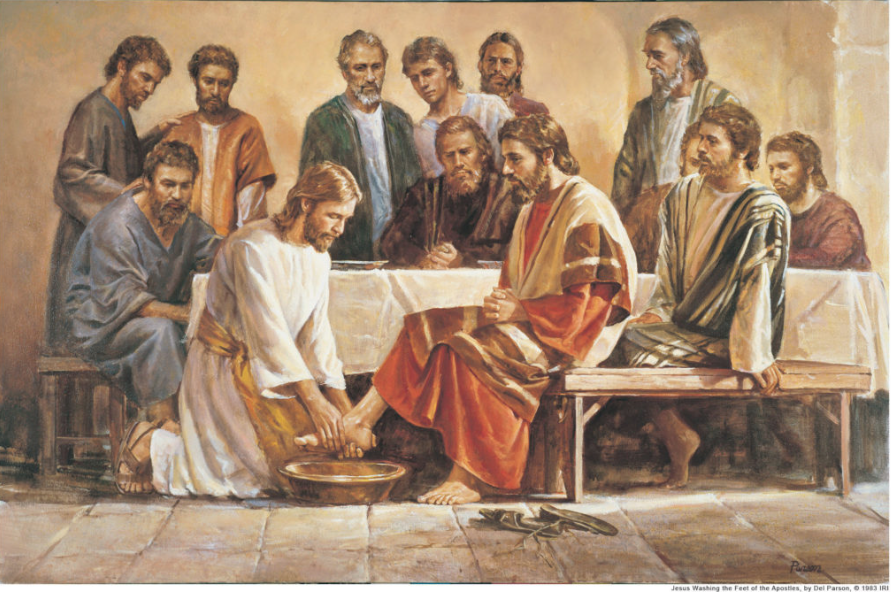
Leading Men’s Small Groups – Success Keys 1-3
As followers of Christ, we are called to “make disciples.” This happens best through the method of small groups. In small groups, people experience true fellowship. They are able to share their joys and pain, they are challenged and held accountable to continued spiritual growth, and friendships are established for a lifetime. More simply put, lives are transformed for Christ and leaders developed for service in the Kingdom. The Holy Spirit does something in the lives of people in small groups that is profound, powerful and important, as people enter into an intimate relationship with God and each other.
When your group becomes marked by a contagious love for one another, then people will want to join it. More and better disciples are made. As your group convincingly demonstrates Christ’s compelling love, you will see people come to know Christ.
We Serve A Powerful God
Jesus said, “Where two or three are gathered in My name, I will be in their midst” (Matthew 18:20). This promise speaks of a meeting (gathered together) with an agenda (in My name) that is blessed with Christ’s presence (in the midst). When believers come together, there is a special sense of His presence. Because of His power, we provoke one another to love and good works, there is a wonderful atmosphere of camaraderie, spiritual growth takes place and love and grace are extended through each other.

Key One: Connect With the Leadership Network in Your Church
Stay in touch with the church staff/division leaders so they will view you as a partner in ministry.
1. Accept leadership responsibility for your group.
Over the years we have developed two categories of people who serve in the church: the clergy and the laity. These categories are foreign to the Bible and have created a serious problem in the way people view how God’s work should be done. Many people feel the work of the church should be done primarily by the clergy. Often you hear people say in an apologetic manner, “I’m only a lay person.”
These confusing terms lead to another myth that the only way for the church to grow is to get more clergy. Nothing is further from the truth. The fact is the majority of the work of the church is done and should be done, by lay people (i.e., volunteer saints) and not clergy (i.e., paid saints).
It was he who gave some as apostles, some as prophets, some as evangelists, and some as pastors and teachers, to equip the saints for the work of ministry, that is, to build up the body of Christ, until we all attain to the unity of the faith and of the knowledge of the Son of God—a mature person, attaining to the measure of Christ’s full stature. So we are no longer to be children, tossed back and forth by waves and carried about by every wind of teaching by the trickery of people who craftily carry out their deceitful schemes. But practicing the truth in love, we will in all things grow up into Christ, who is the head. From him the whole body grows, fitted and held together through every supporting ligament. As each one does its part, the body grows in love. (Ephesians 4:11-16 NET)
As the leader, you must accept responsibility for encouraging people who are seeking God, who are seeking help, who are seeking comfort, and who are seeking to be used by God to change the world.
2. Establish Goals for Your Group.
Someone once said, “If you aim at nothing, you will probably hit it.” The group’s goals will vary, but often include spiritual growth, prayer, accountability, mission or service. Some groups will use a contract or covenant to clarify objectives and expectations. If not written, there should at least be an objective written and then verbally reaffirmed by the group. This includes such things as confidentiality, attendance, accountability, and “open-chair” policies.
In covenant, we will help each other become all that Jesus wants us to be and all you, as the leader, can help them become.
3. All leaders need a ministry supervisor (mentor).
If you don’t link properly with the official authority in your church, you may be looked upon as a renegade. You may make the church staff uncomfortable and uncertain about what is happening.
Scripture charges your pastor with the oversight of your soul (I Peter 2:25). It also cautions you and me not to give grief to our shepherds (2 Corinthians 2:2-5), but rather to be good followers of those who have been assigned authority over us (Hebrews 13:17).
Names of leaders and apprentices typically must be submitted to pastoral staff for approval.

Key Two: Recruit A Leader-in-Training
1. Commit yourself to not only being a maker of disciples, but also a maker of disciple-makers.
You must produce other group leaders. You and I have been left in the world because God is not finished with it yet. In the book of Acts, there were too many needs and not enough ministers. The widows complained. Apostles could have preached a sermon on “Don’t gripe.” Instead, they identified additional leaders who helped them shoulder the load.
Churches will grow only as new workers are released into the ministry (laypeople).
And entrust what you heard me say in the presence of many others as witnesses to faithful people who will be competent to teach others as well. (2 Timothy 2:2 NET)
Sometimes the apprentice surpasses the mentor. Barnabas mentored Paul, but in time the Scripture changed from referring to “Barnabas and Paul” to referring to “Paul and Barnabas.” Apparently, Barnabas restarted the mentoring process with John Mark (Acts 15:36-41).
The central task of the church after listening to God is to develop leaders. The creation of pastoral, ministry-capable leadership must become the core value of the church of the future, second only to listening to God in prayer for direction.
2. Recruit apprentices who are willing to serve as leaders-in-training.
From a leadership development standpoint, the group . . . is a laboratory . . . for training the next generation of volunteer workers. Make sure those you are mentoring understand the difference between an assistant and an apprentice. Your assistant will help you carry a log. An apprentice will learn how to carry the log, and will eventually take it away with a helper of his own. There is a world of difference between the two roles. The ideal is to always be working with three people: one apprentice and two rising apprentices. The leaders of churches that will have a future will be leaders who think of themselves as leader-makers as well as group conveners. Churches who are making leaders will have an expanding ministry.
3. Use spiritual gift identification to draw untapped talent into leadership roles.
In a small group setting, Christians intuitively minister out of God’s grace through their spiritual gift or gifts. In a group, we work hard at catching someone doing good, and then we affirm them. As people are affirmed in their gifts, they come to realize they have a responsibility for the stewardship of those gifts. Resources to identify your spiritual gifts are available through the church. Contact an associate pastor.
The more mature you become, the more you rely on the work of God to be done through other believers. As a community of faith, God will give each person you need to you when you need them. Don’t get frustrated or discouraged and start to do things that lead to burnout.
There is an invisible layer of untapped leadership in almost every congregation. If each year your church develops just 10 new ministry-capable leaders with apprentices, you could easily add 100 people to your congregation.
4. Train your apprentice by modeling and feedback.
Give your apprentice a leadership role in every meeting and between every meeting. Between meetings, apprentices can help with praying, phoning, contacting prospects, followup on new people and contacting absentees.
The secret of a group’s vitality is found in what happens between meetings as much as in meetings. Modeling and feedback are indispensable. A good training sequence is . . .
1. I lead, you watch, we talk.
2. I lead, you help, we talk.
3. You lead, I help, we talk.
4. You lead, I watch, we talk.
5. We begin to train someone else.
6. You branch out to lead your own group.

Key Three: Invite New Comers To Your Group
After you have gotten your nucleus leadership group together several times for prayer and to decide on the primary purpose for the group, it is time to begin to ask God to show you who you should invite to join the group.
A good size for a group is 8-12 people. You may need to invite as many as 20 people to get to this size. It is best to invite people who have a natural affinity for one another, i.e. work at the same job, go to the same Sunday School class, have the same hobbies or interests, possibly the same age, maybe struggling with similar problems, etc.
1. Meet with your leadership nucleus.
First, you need to be intentional about connecting spiritually with one another. You must really want to love and care for one another beyond just another meeting. Next, firm up the purpose of the group in writing. Now ask yourselves the question, “How important is it for us to model the kinds of relationships we are going to be developing?” The more you experience a genuine spiritual community together, the more enthusiastic you will be about inviting others into this same sense of deep fellowship.
2. Create a contact list with your other leaders.
People who come to your invitation because you know them are more likely to be open to receiving care from you than those who are arbitrarily assigned to you. People will feel loved and cared for when you have time to hear from their hearts.
Affinity-based selection is like when you have a child choosing from a litter of puppies, and the one he chooses is the puppy that just won’t leave him alone. Try to develop a contact list of people who just naturally want to be together. The ideal is that everyone who is a leader has been somewhat selected by each participant or follower.
3. Prioritize the Contact List and be warm and enthusiastic when you call.
Some people are in need of new relationships, such as visitors, unchurched friends, new members, or folks facing particularly difficult times. Go for the people who are most likely to join the group first.
In many churches, there is an appalling lack of contagious love, and they usually don’t know it. Many churches that consider themselves friendly churches are not. People need to know that we want to share our life with them. They need to know that group is a safe place where they can come and be accepted, not judged. They need to feel this way from the very moment they are invited to be a part of group.
We need to also make being a part of a group a privilege and a virtue.
(2)
Small Groups Series:
- Leading Men’s Small Groups – Introduction
- Leading Men’s Small Groups – Success Keys 1-3
- Leading Men’s Small Groups – Success Keys 4-6
- Leading Men’s Small Groups – Success Keys 7-9
- Leading Men’s Small Groups – How To Support Men Going Through Difficult Times
(1) Left-click on the underlined phrase to open another article in a different tab with more explanation.
(2) This article contains a partial synopsis of Carl George’s book, Nine Keys To Effective Small Group Leadership. It is a must-read for anyone considering leading small groups. It is highly recommended that you purchase the book. It is a clear, practical guide on how to be successful at leading a small group.
Nine Keys to Effective Small Group Leadership
by Carl George (Author), Warren Bird (Editor) 1997, 2007
ISBN-13: 978-0-9795350-0-0
ISBN-10: 097953500X



